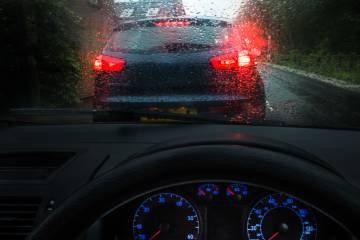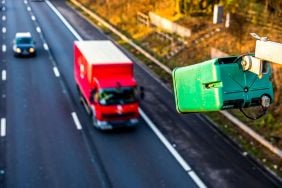The average cost of car insurance is £777, according to our car insurance price index*. With the cost of living continuing to rise, that can often be a difficult chunk of money to pay.
Let us share our secrets for getting cheaper car insurance with you.
1. Don't accept your renewal price - compare quotes
Insurers can no longer charge loyal customers more than new customers for a like-for-like policy. This change, introduced in January 2022, banned ‘price-walking’ and ‘loyalty premiums’ – where long-term customers were penalised with higher renewal prices.
You might assume this means your car insurance price won’t increase at renewal. But that’s not always the case.
Many factors affect the price of car insurance. But even if your quote hasn't gone up, it's always worth shopping around to see if you could save on your car insurance.
And lucky for you, that's something we're good at.
Try comparing insurance mid-policy
You don’t always need to wait for your renewal to look for a better deal. Comparing car insurance quotes mid-policy could help you lower your car insurance, especially if prices have dropped or your circumstances have changed.
However, be mindful of cancellation fees if you decide to switch before your policy ends. Make sure to calculate these costs to check if switching really does work out cheaper overall.
Try negotiating with your current car insurance provider
It’s always worth calling or emailing your current provider to see if they can improve the renewal offer they’ve sent you.
Insurance companies want to keep your business, so if you’ve found a cheaper quote elsewhere, let them know. There’s a good chance they’ll match or even lower your car insurance quote to encourage you to stay with them.
2. Choosing the right car to insure
Before buying a car, it’s important to check its insurance group. The insurance group your car falls into can impact how much you pay. Cars in higher insurance groups are often more expensive to insure because they’re seen as riskier or more costly to repair.
If you’re looking for cheaper insurance, consider cars with:
- Smaller engine sizes – Less power means less risk.
- Lower performance – Cars with modest acceleration and top speeds are generally cheaper to cover.
- Better fuel efficiency – Economical cars are often cheaper to maintain and repair.
Modifications can increase car insurance cost
Adding aftermarket parts to improve your car’s looks, like body kits, might make your vehicle more appealing to thieves. This can increase the risk and, in turn, how much you pay for your insurance.
Performance modifications, such as engine upgrades or enhancements that make your car faster, can also drive up costs. A more powerful car is seen as riskier to insure because of the higher chance of accidents.
If you’re considering modifying your car, it’s always worth checking with your insurer first to understand how it might affect your premium.
3. Pay for your car insurance annually
If you can afford it, paying for your insurance in one go rather than monthly is one way to get cheaper car insurance.
Paying for your car insurance policy in monthly instalments might help you budget, but you pay more for the convenience.
That’s because insurance companies always charge interest for spreading the cost of your cover over the year.
Your credit score can also impact what you pay for your car insurance, so if you have a low rating and opt to pay monthly, you may end up paying more for the privilege.
4. Be accurate with your mileage
Generally, the more miles you drive, the more likely you are to have an accident and make a claim. This means the higher your mileage, the more you pay for your car insurance.
So, driving fewer miles can be a great way to lower your car insurance costs.
But don’t assume that a low mileage always means low prices. If you barely drive at all, your insurance company could see that as a risk as well.
The trick is not under- or over-estimating your mileage. Check your odometer and get the real figure. You could even compare your last 2 MOT reports for a rough idea of how many miles you drive each year.
How do I check my mileage on my MOT?
Enter your registration at the government's MOT checking service and select 'MOT history'. Take the mileage readings from the last 2 years, deduct one from the other and you have your annual mileage.
5. Enhance your car security
The harder it is to steal your car, the less of a risk it is. This usually means cheaper car insurance.
There are several ways to improve your car security including:
- Installing a Thatcham-approved car alarm or immobiliser. Most cars made after 1997 have an engine immobiliser and alarm fitted as standard.
- Adding secondary levels of security like a steering lock.
- Parking overnight in a secure, well-lit car park.
- Considering a tracker device to recover your car if it’s stolen.
6. Consider a black box policy
A telematics (black box) policy calculates your insurance costs based on how, when and how much you drive.
There might be some restrictions on how you use your car with a black box, though. For example, driving curfews or mileage caps. But if you drive safely and responsibly and avoid late-night driving, you may get cheaper car insurance prices.
A black box policy is usually popular with younger drivers because car insurance for young drivers is typically more expensive, so these types of policies can help reduce the cost. Black box policies seem to appeal to new drivers who have less experience on the road because of how they work; they encourage safe driving habits.
7. Consider how you use your car
If you're only using your car to drive to the shops, you don't need a policy that covers commuting. Likewise, if you start using your car to make deliveries on the weekend, you might need car insurance that includes business use.
What class of use you go for has an impact on the price you pay. But it's important to be honest about how you use your car, otherwise your may find that any future claims are rejected.
If you only need to drive your car occasionally, you might want to think about temporary car insurance. You can insure your car from anything from an hour to 28 days and it's quick to arrange.
8. Consider your cover type
Some people assume that your car insurance will be cheaper if you go for a third-party, fire and theft policy rather than fully comprehensive car insurance.
This isn't always true,. In fact third-party insurance can often be more expensive. This is because higher risk drivers often go for this level of cover, assuming it's the cheapest option, without shopping around.
Multi car insurance could be cheaper
If there are multiple cars in your household or immediate family, a multi car insurance policy could help you save money. By insuring all the vehicles under one policy, you might benefit from discounts that aren’t available with separate policies.
9. Increase your voluntary excess
Your car insurance excess is what you'd have to pay out if you made a claim.
You can’t change your compulsory excess, but you can change your voluntary excess. Increasing your voluntary excess can help you get cheaper car insurance, but you need to make sure you can afford to pay it, if you need to claim.
10. Check your job title
Your job affects your lifestyle, which affects how you drive. Even if you don't drive as part of your job, it could still have an impact.
An office worker, for example, might only drive their car to work and back on the 9-5 commute. But someone who does security at a nightclub might drive in a busy city centre at unsociable hours.
From an insurer's point of view, the office worker is much less likely to claim on their car insurance.
There are also many ways to describe the same job, and different insurance companies might use slight variations of similar job titles.
This means your price could change depending on the specific job title you use. So it’s worth looking at the most relevant variations to see how it could impact your price.
Always make sure the job title you choose is an accurate reflection of the work you do though. Claim to do a different job and you risk invalidating your policy.
11. Think about your named drivers
Sometimes, adding a named driver to your policy helps you get cheaper car insurance. This is most likely if your named driver is older and has more driving experience.
Adding several younger, inexperienced drivers could have the opposite effect. This is because they're higher risk and more likely to be involved in an accident.
If you've got a friend of family member on your policy and they don't drive your car, consider removing them. If they only need to use your car for a few days or hours at a time, they could get temporary car insurance instead.
Be careful that the person listed as the main driver actually does most of the driving. If not, you could be guilty of fronting.
12. Keep a clean driving licence
Having a motoring conviction and points on your licence make you a bigger risk to insurers. So keep your licence clean if you want to get cheaper car insurance.
The DLVA keeps most points on your licence for 4 years. But insurance companies keep them on their records for 5 years.
And if you have more serious convictions such as drink-driving and driving without insurance, you could see that your options for cover are more restricted.
13. Build and protect your no-claims bonus
Every year you go without making a claim on your car insurance boosts your no-claims bonus (NCB).
The more bonus you gain, the bigger a discount you get when you buy your car insurance. Building up several years' of NCB could see your costs come down significantly.
Another option is to get a protected no-claims bonus. This is an add-on to your policy that allows you to make a certain number of claims without your no-claims bonus being affected. This comes at an extra cost, though and is usually available for drivers who have over 4 years' experience.
14. Consider taking a driving course
Taking an advanced driving course could help lower how much you pay. By improving your driving skills, you may be seen as a lower risk by insurers, which could lead to discounts on your policy.
Here are a couple of courses to consider:
- IAM RoadSmart: These courses are aimed at improving driving skills for various groups, including young drivers and older motorists. Their advanced courses cover key areas such as observation, timing, and positioning on the road. Completing the course and passing the test earns you an IAM certificate, which could result in insurance discounts.
- Pass Plus: This course is designed for new drivers but is open to anyone. It focuses on building confidence and experience in different scenarios, like driving at night, on motorways, or in adverse weather. Some insurers recognise Pass Plus as evidence of safer driving and may offer reduced premiums.
The cost of a Pass Plus course depends on where you live, the instructor or driving school and how long your training takes. Some local councils can offer discounts off the full Pass Plus training costs. According to the RAC you can expect to pay around £200-£300* for a Pass Plus course. However if you live in Wales it only costs £20!
*Correct as of Jan 2025
15. Park securely or off road if you can
If you park your car on the road it's at a much greater risk of theft. This means that it's usually better to park it off road - in a secure garage or on the driveway. When you're away from home always go for secure and well-lit car park.
16. The best time to buy car insurance
Generally, the closer you get to your renewal date, the more expensive other quotes could become.
You should get your renewal letter from your current insurance company around 3 weeks before the renewal date.
The letter should tell you what you paid for your car insurance last year, as well as what your policy will cost this year.
So act quickly. As soon as you get that renewal letter, shop around and compare quotes with the renewal price from your current insurer.
It only takes a few moments, but could save you money.
* Confused.com car insurance price index, Q4 2024






